PSYC-1124 - Research Proposal on Genetics and Antisocial Behavior
VerifiedAdded on 2023/06/18
|11
|2514
|416
AI Summary
This research proposal investigates the genetic contributions to antisocial behavior, focusing on understanding the concept of antisocial behavior and genetic approaches, examining the different risk factors associated with it, and determining the genetic and environmental influences. The proposal includes a literature review covering themes such as the definition of antisocial behavior, associated risk factors including biological and social aspects, and the impact of genetic and environmental factors. The research methodology outlines a quantitative approach using experimental analysis and conclusive research design, employing primary data collection methods and statistical analysis with SPSS. Ethical considerations are also addressed, emphasizing participant protection, respect for dignity, informed consent, and data confidentiality. The study aims to provide insights into the complex interplay between genetics and antisocial behavior.

Genetics and antisocial behavior
1
1
Paraphrase This Document
Need a fresh take? Get an instant paraphrase of this document with our AI Paraphraser
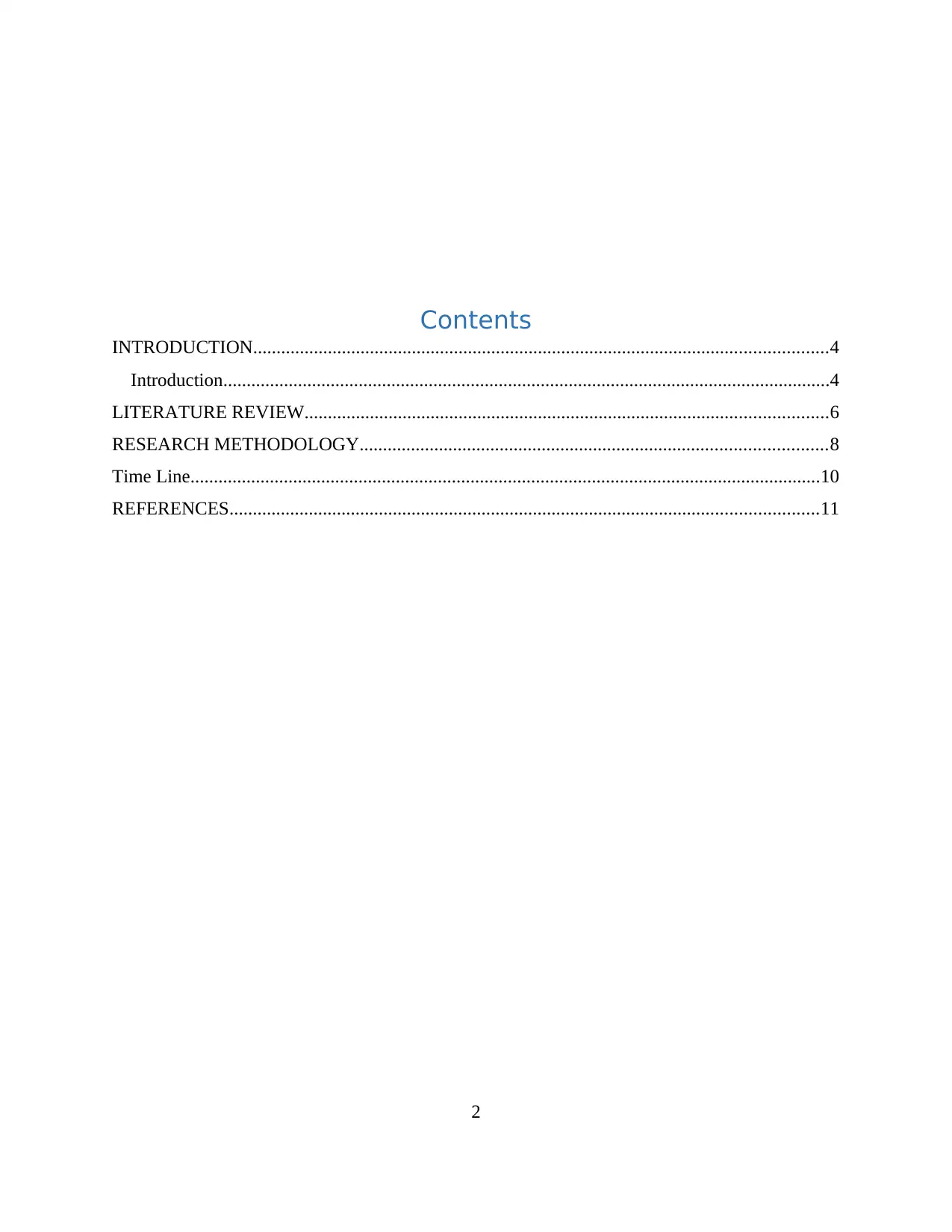
Contents
INTRODUCTION...........................................................................................................................4
Introduction..................................................................................................................................4
LITERATURE REVIEW................................................................................................................6
RESEARCH METHODOLOGY....................................................................................................8
Time Line.......................................................................................................................................10
REFERENCES..............................................................................................................................11
2
INTRODUCTION...........................................................................................................................4
Introduction..................................................................................................................................4
LITERATURE REVIEW................................................................................................................6
RESEARCH METHODOLOGY....................................................................................................8
Time Line.......................................................................................................................................10
REFERENCES..............................................................................................................................11
2

3
⊘ This is a preview!⊘
Do you want full access?
Subscribe today to unlock all pages.

Trusted by 1+ million students worldwide
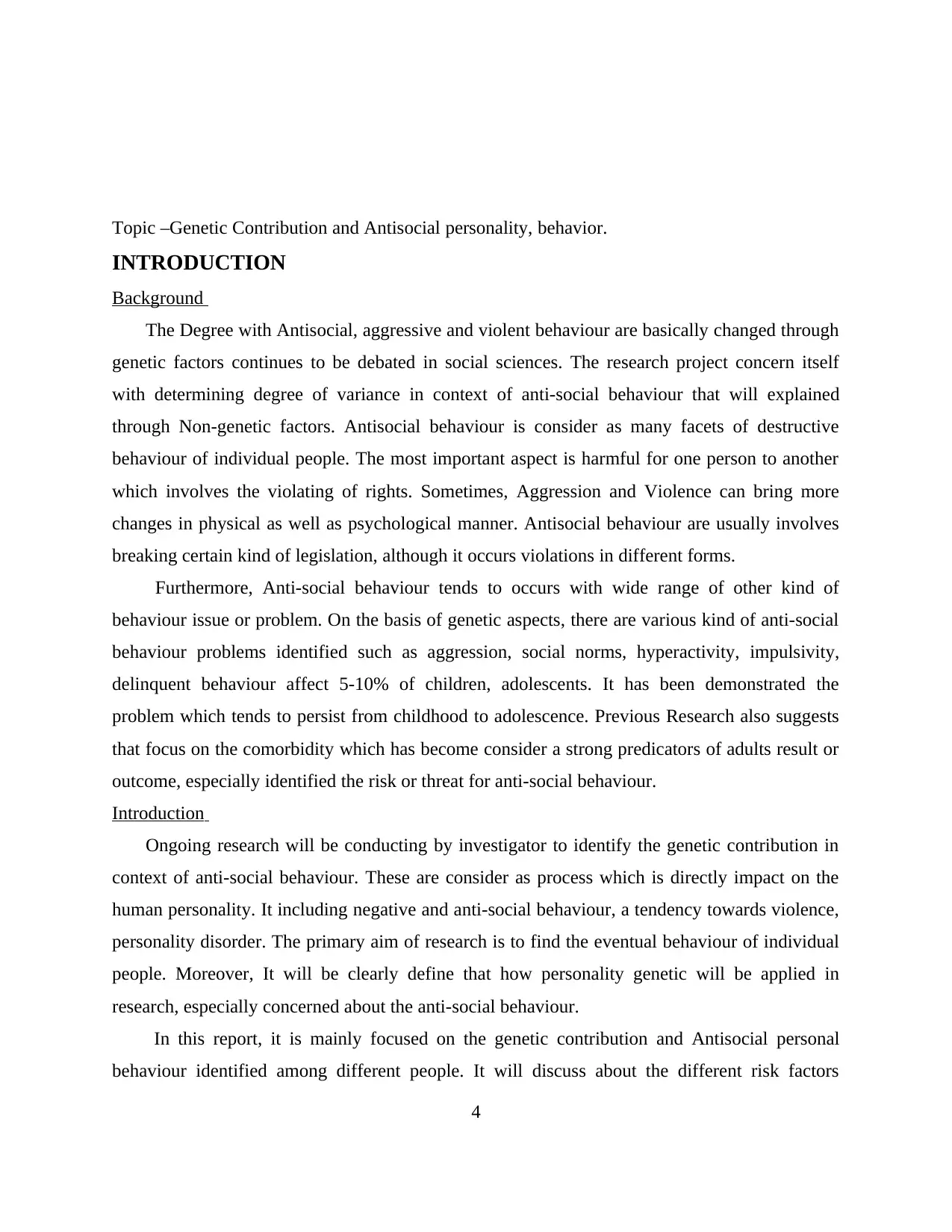
Topic –Genetic Contribution and Antisocial personality, behavior.
INTRODUCTION
Background
The Degree with Antisocial, aggressive and violent behaviour are basically changed through
genetic factors continues to be debated in social sciences. The research project concern itself
with determining degree of variance in context of anti-social behaviour that will explained
through Non-genetic factors. Antisocial behaviour is consider as many facets of destructive
behaviour of individual people. The most important aspect is harmful for one person to another
which involves the violating of rights. Sometimes, Aggression and Violence can bring more
changes in physical as well as psychological manner. Antisocial behaviour are usually involves
breaking certain kind of legislation, although it occurs violations in different forms.
Furthermore, Anti-social behaviour tends to occurs with wide range of other kind of
behaviour issue or problem. On the basis of genetic aspects, there are various kind of anti-social
behaviour problems identified such as aggression, social norms, hyperactivity, impulsivity,
delinquent behaviour affect 5-10% of children, adolescents. It has been demonstrated the
problem which tends to persist from childhood to adolescence. Previous Research also suggests
that focus on the comorbidity which has become consider a strong predicators of adults result or
outcome, especially identified the risk or threat for anti-social behaviour.
Introduction
Ongoing research will be conducting by investigator to identify the genetic contribution in
context of anti-social behaviour. These are consider as process which is directly impact on the
human personality. It including negative and anti-social behaviour, a tendency towards violence,
personality disorder. The primary aim of research is to find the eventual behaviour of individual
people. Moreover, It will be clearly define that how personality genetic will be applied in
research, especially concerned about the anti-social behaviour.
In this report, it is mainly focused on the genetic contribution and Antisocial personal
behaviour identified among different people. It will discuss about the different risk factors
4
INTRODUCTION
Background
The Degree with Antisocial, aggressive and violent behaviour are basically changed through
genetic factors continues to be debated in social sciences. The research project concern itself
with determining degree of variance in context of anti-social behaviour that will explained
through Non-genetic factors. Antisocial behaviour is consider as many facets of destructive
behaviour of individual people. The most important aspect is harmful for one person to another
which involves the violating of rights. Sometimes, Aggression and Violence can bring more
changes in physical as well as psychological manner. Antisocial behaviour are usually involves
breaking certain kind of legislation, although it occurs violations in different forms.
Furthermore, Anti-social behaviour tends to occurs with wide range of other kind of
behaviour issue or problem. On the basis of genetic aspects, there are various kind of anti-social
behaviour problems identified such as aggression, social norms, hyperactivity, impulsivity,
delinquent behaviour affect 5-10% of children, adolescents. It has been demonstrated the
problem which tends to persist from childhood to adolescence. Previous Research also suggests
that focus on the comorbidity which has become consider a strong predicators of adults result or
outcome, especially identified the risk or threat for anti-social behaviour.
Introduction
Ongoing research will be conducting by investigator to identify the genetic contribution in
context of anti-social behaviour. These are consider as process which is directly impact on the
human personality. It including negative and anti-social behaviour, a tendency towards violence,
personality disorder. The primary aim of research is to find the eventual behaviour of individual
people. Moreover, It will be clearly define that how personality genetic will be applied in
research, especially concerned about the anti-social behaviour.
In this report, it is mainly focused on the genetic contribution and Antisocial personal
behaviour identified among different people. It will discuss about the different risk factors
4
Paraphrase This Document
Need a fresh take? Get an instant paraphrase of this document with our AI Paraphraser
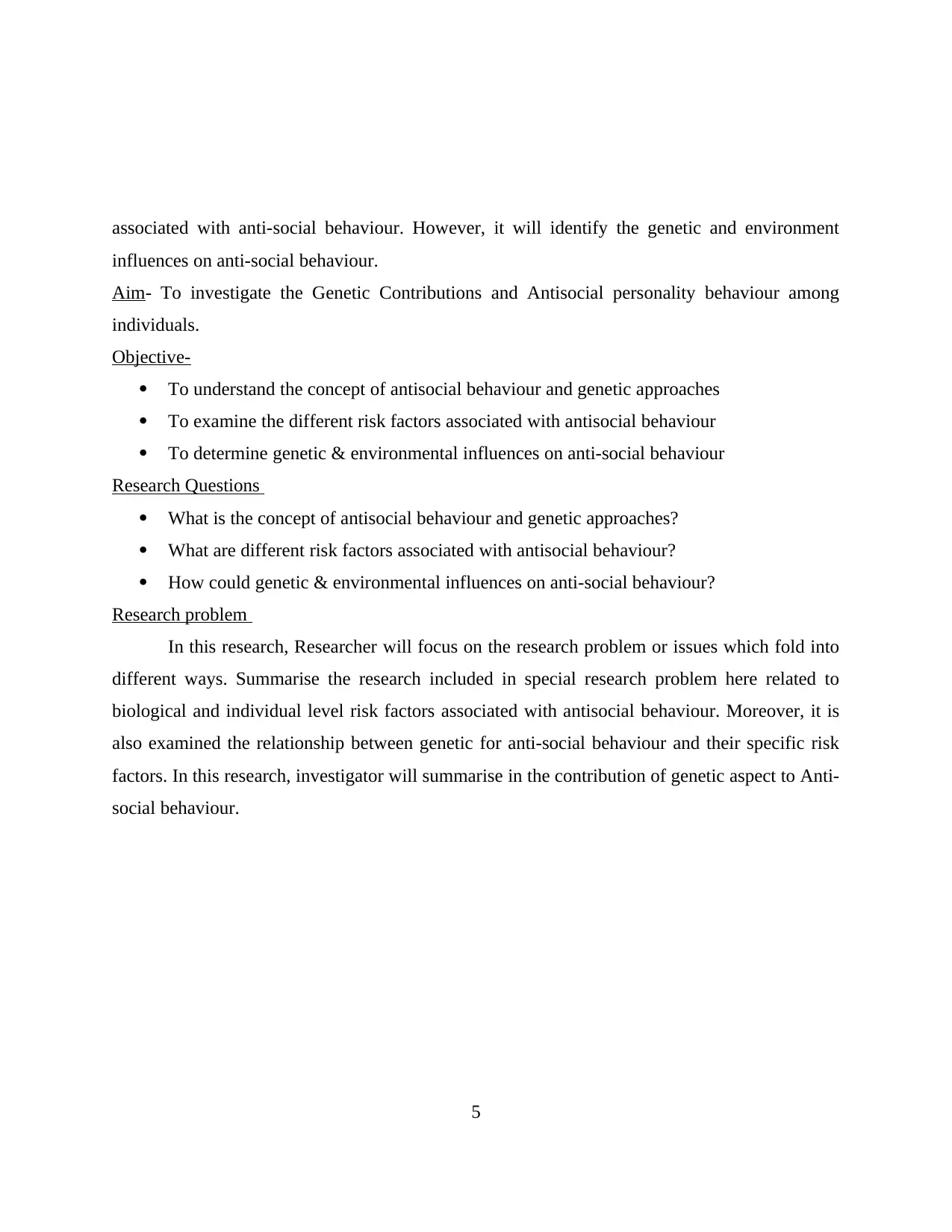
associated with anti-social behaviour. However, it will identify the genetic and environment
influences on anti-social behaviour.
Aim- To investigate the Genetic Contributions and Antisocial personality behaviour among
individuals.
Objective-
To understand the concept of antisocial behaviour and genetic approaches
To examine the different risk factors associated with antisocial behaviour
To determine genetic & environmental influences on anti-social behaviour
Research Questions
What is the concept of antisocial behaviour and genetic approaches?
What are different risk factors associated with antisocial behaviour?
How could genetic & environmental influences on anti-social behaviour?
Research problem
In this research, Researcher will focus on the research problem or issues which fold into
different ways. Summarise the research included in special research problem here related to
biological and individual level risk factors associated with antisocial behaviour. Moreover, it is
also examined the relationship between genetic for anti-social behaviour and their specific risk
factors. In this research, investigator will summarise in the contribution of genetic aspect to Anti-
social behaviour.
5
influences on anti-social behaviour.
Aim- To investigate the Genetic Contributions and Antisocial personality behaviour among
individuals.
Objective-
To understand the concept of antisocial behaviour and genetic approaches
To examine the different risk factors associated with antisocial behaviour
To determine genetic & environmental influences on anti-social behaviour
Research Questions
What is the concept of antisocial behaviour and genetic approaches?
What are different risk factors associated with antisocial behaviour?
How could genetic & environmental influences on anti-social behaviour?
Research problem
In this research, Researcher will focus on the research problem or issues which fold into
different ways. Summarise the research included in special research problem here related to
biological and individual level risk factors associated with antisocial behaviour. Moreover, it is
also examined the relationship between genetic for anti-social behaviour and their specific risk
factors. In this research, investigator will summarise in the contribution of genetic aspect to Anti-
social behaviour.
5
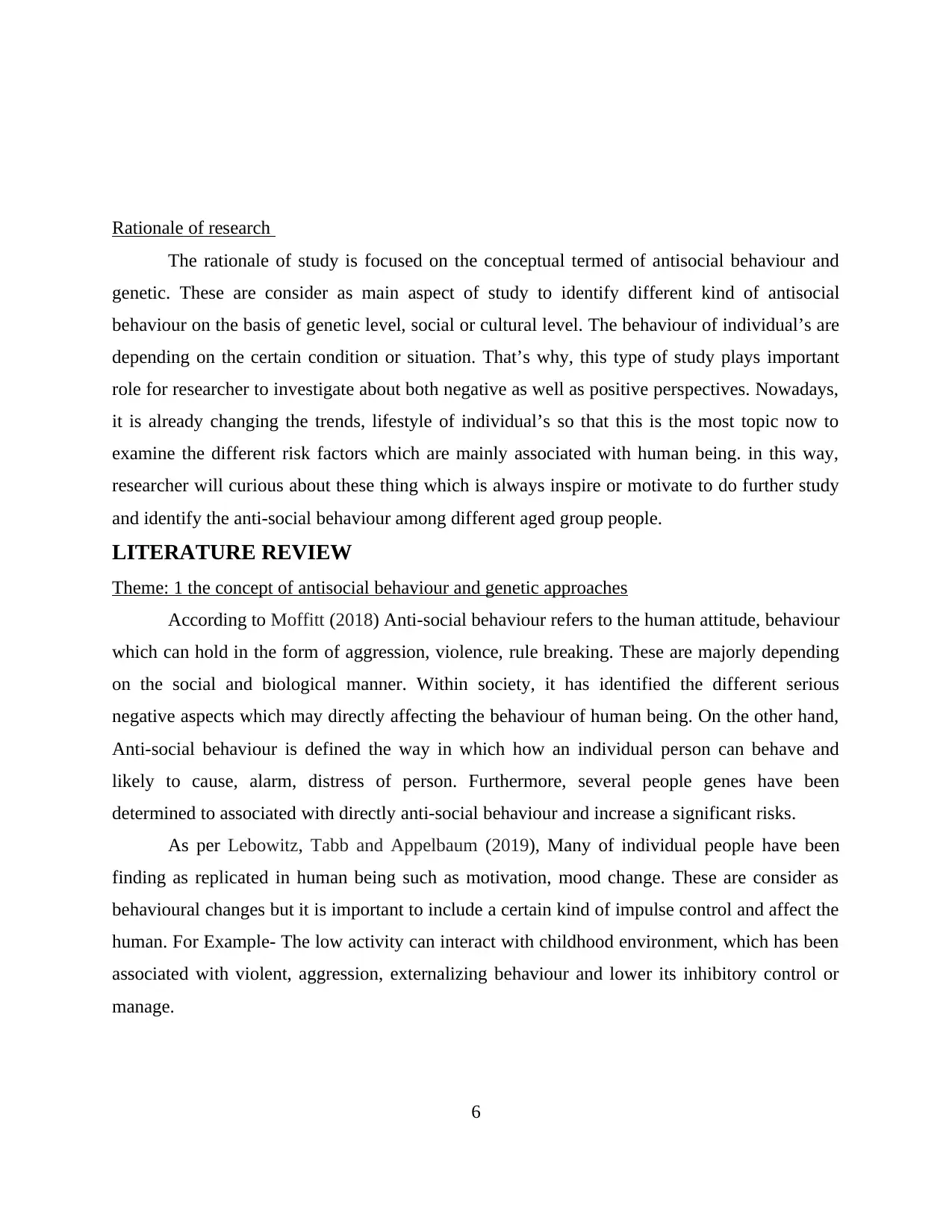
Rationale of research
The rationale of study is focused on the conceptual termed of antisocial behaviour and
genetic. These are consider as main aspect of study to identify different kind of antisocial
behaviour on the basis of genetic level, social or cultural level. The behaviour of individual’s are
depending on the certain condition or situation. That’s why, this type of study plays important
role for researcher to investigate about both negative as well as positive perspectives. Nowadays,
it is already changing the trends, lifestyle of individual’s so that this is the most topic now to
examine the different risk factors which are mainly associated with human being. in this way,
researcher will curious about these thing which is always inspire or motivate to do further study
and identify the anti-social behaviour among different aged group people.
LITERATURE REVIEW
Theme: 1 the concept of antisocial behaviour and genetic approaches
According to Moffitt (2018) Anti-social behaviour refers to the human attitude, behaviour
which can hold in the form of aggression, violence, rule breaking. These are majorly depending
on the social and biological manner. Within society, it has identified the different serious
negative aspects which may directly affecting the behaviour of human being. On the other hand,
Anti-social behaviour is defined the way in which how an individual person can behave and
likely to cause, alarm, distress of person. Furthermore, several people genes have been
determined to associated with directly anti-social behaviour and increase a significant risks.
As per Lebowitz, Tabb and Appelbaum (2019), Many of individual people have been
finding as replicated in human being such as motivation, mood change. These are consider as
behavioural changes but it is important to include a certain kind of impulse control and affect the
human. For Example- The low activity can interact with childhood environment, which has been
associated with violent, aggression, externalizing behaviour and lower its inhibitory control or
manage.
6
The rationale of study is focused on the conceptual termed of antisocial behaviour and
genetic. These are consider as main aspect of study to identify different kind of antisocial
behaviour on the basis of genetic level, social or cultural level. The behaviour of individual’s are
depending on the certain condition or situation. That’s why, this type of study plays important
role for researcher to investigate about both negative as well as positive perspectives. Nowadays,
it is already changing the trends, lifestyle of individual’s so that this is the most topic now to
examine the different risk factors which are mainly associated with human being. in this way,
researcher will curious about these thing which is always inspire or motivate to do further study
and identify the anti-social behaviour among different aged group people.
LITERATURE REVIEW
Theme: 1 the concept of antisocial behaviour and genetic approaches
According to Moffitt (2018) Anti-social behaviour refers to the human attitude, behaviour
which can hold in the form of aggression, violence, rule breaking. These are majorly depending
on the social and biological manner. Within society, it has identified the different serious
negative aspects which may directly affecting the behaviour of human being. On the other hand,
Anti-social behaviour is defined the way in which how an individual person can behave and
likely to cause, alarm, distress of person. Furthermore, several people genes have been
determined to associated with directly anti-social behaviour and increase a significant risks.
As per Lebowitz, Tabb and Appelbaum (2019), Many of individual people have been
finding as replicated in human being such as motivation, mood change. These are consider as
behavioural changes but it is important to include a certain kind of impulse control and affect the
human. For Example- The low activity can interact with childhood environment, which has been
associated with violent, aggression, externalizing behaviour and lower its inhibitory control or
manage.
6
⊘ This is a preview!⊘
Do you want full access?
Subscribe today to unlock all pages.

Trusted by 1+ million students worldwide
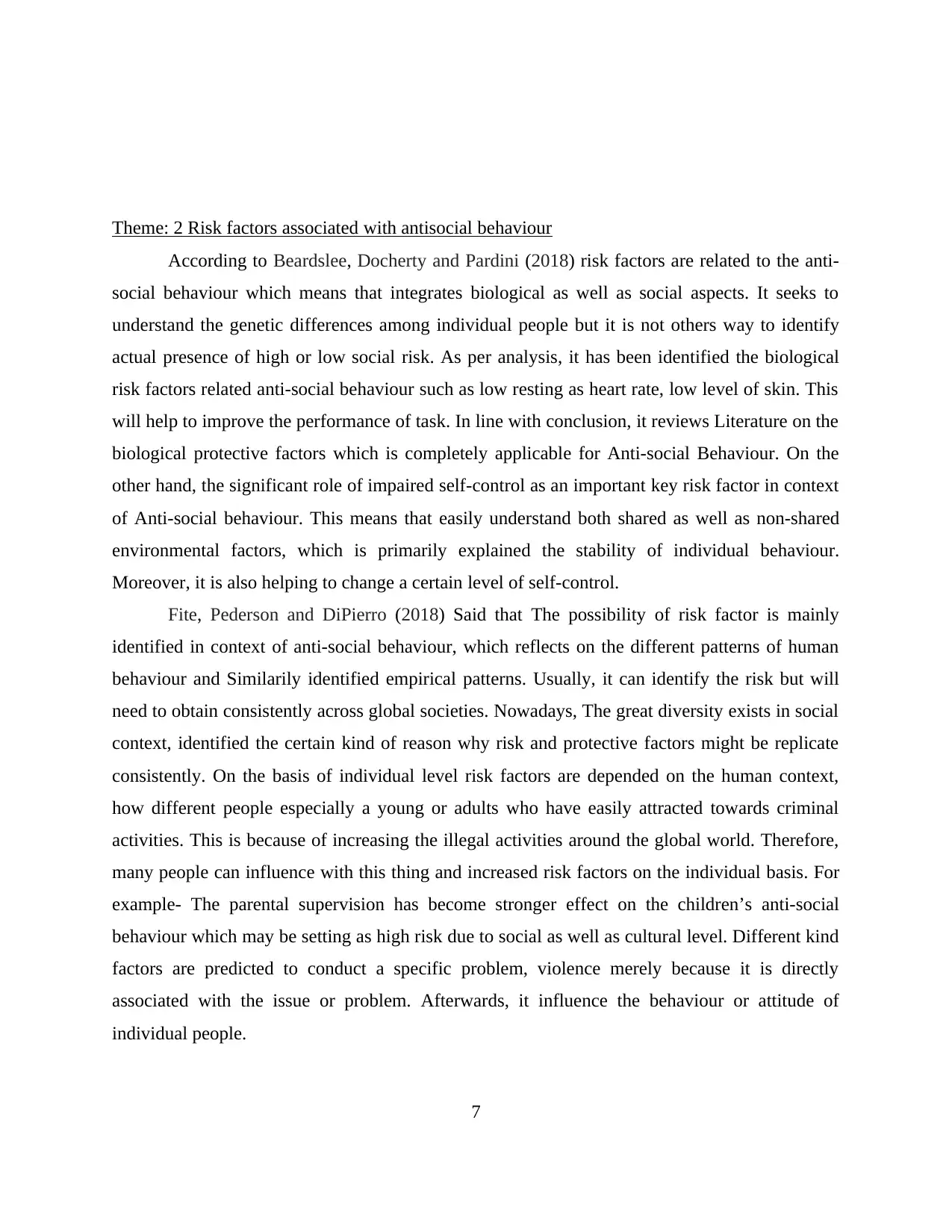
Theme: 2 Risk factors associated with antisocial behaviour
According to Beardslee, Docherty and Pardini (2018) risk factors are related to the anti-
social behaviour which means that integrates biological as well as social aspects. It seeks to
understand the genetic differences among individual people but it is not others way to identify
actual presence of high or low social risk. As per analysis, it has been identified the biological
risk factors related anti-social behaviour such as low resting as heart rate, low level of skin. This
will help to improve the performance of task. In line with conclusion, it reviews Literature on the
biological protective factors which is completely applicable for Anti-social Behaviour. On the
other hand, the significant role of impaired self-control as an important key risk factor in context
of Anti-social behaviour. This means that easily understand both shared as well as non-shared
environmental factors, which is primarily explained the stability of individual behaviour.
Moreover, it is also helping to change a certain level of self-control.
Fite, Pederson and DiPierro (2018) Said that The possibility of risk factor is mainly
identified in context of anti-social behaviour, which reflects on the different patterns of human
behaviour and Similarily identified empirical patterns. Usually, it can identify the risk but will
need to obtain consistently across global societies. Nowadays, The great diversity exists in social
context, identified the certain kind of reason why risk and protective factors might be replicate
consistently. On the basis of individual level risk factors are depended on the human context,
how different people especially a young or adults who have easily attracted towards criminal
activities. This is because of increasing the illegal activities around the global world. Therefore,
many people can influence with this thing and increased risk factors on the individual basis. For
example- The parental supervision has become stronger effect on the children’s anti-social
behaviour which may be setting as high risk due to social as well as cultural level. Different kind
factors are predicted to conduct a specific problem, violence merely because it is directly
associated with the issue or problem. Afterwards, it influence the behaviour or attitude of
individual people.
7
According to Beardslee, Docherty and Pardini (2018) risk factors are related to the anti-
social behaviour which means that integrates biological as well as social aspects. It seeks to
understand the genetic differences among individual people but it is not others way to identify
actual presence of high or low social risk. As per analysis, it has been identified the biological
risk factors related anti-social behaviour such as low resting as heart rate, low level of skin. This
will help to improve the performance of task. In line with conclusion, it reviews Literature on the
biological protective factors which is completely applicable for Anti-social Behaviour. On the
other hand, the significant role of impaired self-control as an important key risk factor in context
of Anti-social behaviour. This means that easily understand both shared as well as non-shared
environmental factors, which is primarily explained the stability of individual behaviour.
Moreover, it is also helping to change a certain level of self-control.
Fite, Pederson and DiPierro (2018) Said that The possibility of risk factor is mainly
identified in context of anti-social behaviour, which reflects on the different patterns of human
behaviour and Similarily identified empirical patterns. Usually, it can identify the risk but will
need to obtain consistently across global societies. Nowadays, The great diversity exists in social
context, identified the certain kind of reason why risk and protective factors might be replicate
consistently. On the basis of individual level risk factors are depended on the human context,
how different people especially a young or adults who have easily attracted towards criminal
activities. This is because of increasing the illegal activities around the global world. Therefore,
many people can influence with this thing and increased risk factors on the individual basis. For
example- The parental supervision has become stronger effect on the children’s anti-social
behaviour which may be setting as high risk due to social as well as cultural level. Different kind
factors are predicted to conduct a specific problem, violence merely because it is directly
associated with the issue or problem. Afterwards, it influence the behaviour or attitude of
individual people.
7
Paraphrase This Document
Need a fresh take? Get an instant paraphrase of this document with our AI Paraphraser
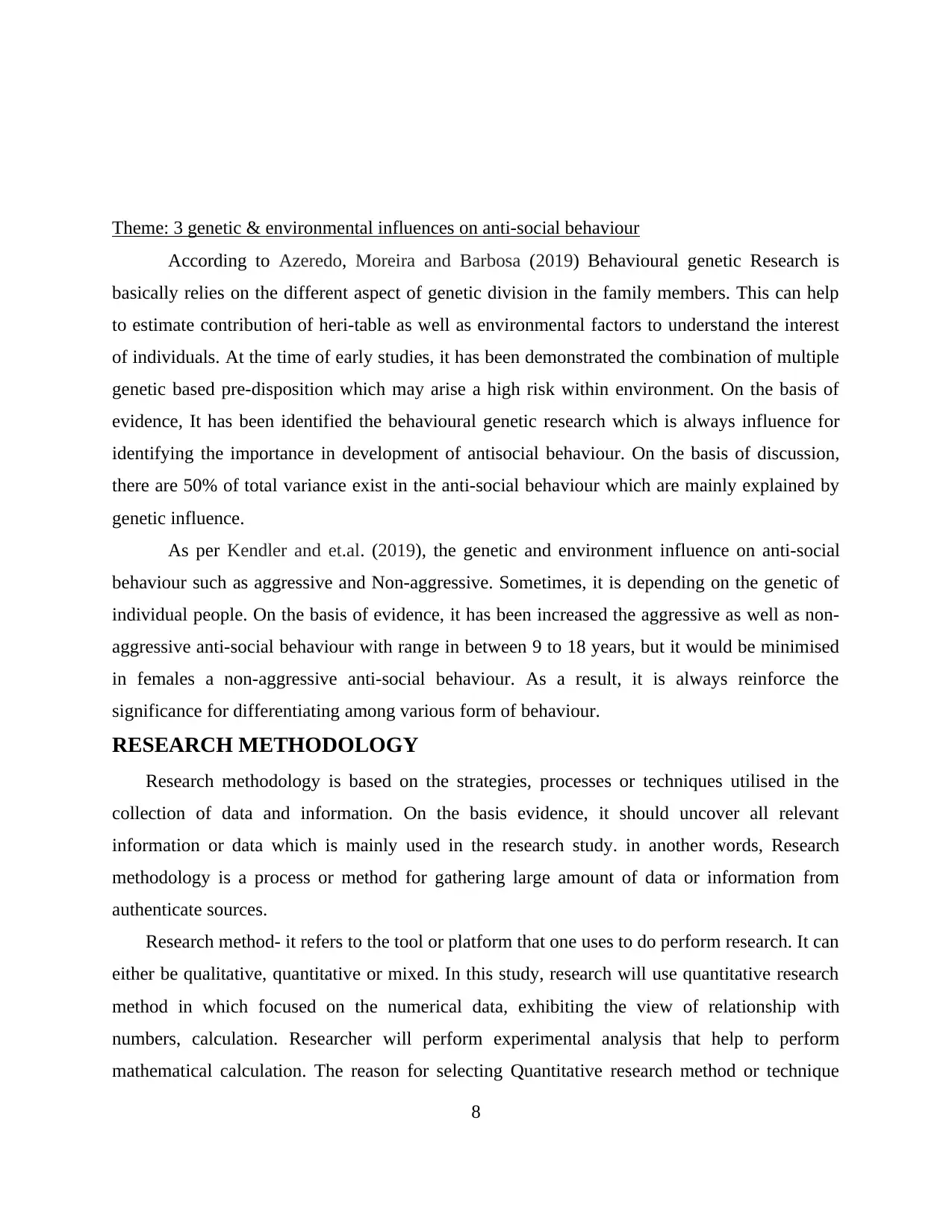
Theme: 3 genetic & environmental influences on anti-social behaviour
According to Azeredo, Moreira and Barbosa (2019) Behavioural genetic Research is
basically relies on the different aspect of genetic division in the family members. This can help
to estimate contribution of heri-table as well as environmental factors to understand the interest
of individuals. At the time of early studies, it has been demonstrated the combination of multiple
genetic based pre-disposition which may arise a high risk within environment. On the basis of
evidence, It has been identified the behavioural genetic research which is always influence for
identifying the importance in development of antisocial behaviour. On the basis of discussion,
there are 50% of total variance exist in the anti-social behaviour which are mainly explained by
genetic influence.
As per Kendler and et.al. (2019), the genetic and environment influence on anti-social
behaviour such as aggressive and Non-aggressive. Sometimes, it is depending on the genetic of
individual people. On the basis of evidence, it has been increased the aggressive as well as non-
aggressive anti-social behaviour with range in between 9 to 18 years, but it would be minimised
in females a non-aggressive anti-social behaviour. As a result, it is always reinforce the
significance for differentiating among various form of behaviour.
RESEARCH METHODOLOGY
Research methodology is based on the strategies, processes or techniques utilised in the
collection of data and information. On the basis evidence, it should uncover all relevant
information or data which is mainly used in the research study. in another words, Research
methodology is a process or method for gathering large amount of data or information from
authenticate sources.
Research method- it refers to the tool or platform that one uses to do perform research. It can
either be qualitative, quantitative or mixed. In this study, research will use quantitative research
method in which focused on the numerical data, exhibiting the view of relationship with
numbers, calculation. Researcher will perform experimental analysis that help to perform
mathematical calculation. The reason for selecting Quantitative research method or technique
8
According to Azeredo, Moreira and Barbosa (2019) Behavioural genetic Research is
basically relies on the different aspect of genetic division in the family members. This can help
to estimate contribution of heri-table as well as environmental factors to understand the interest
of individuals. At the time of early studies, it has been demonstrated the combination of multiple
genetic based pre-disposition which may arise a high risk within environment. On the basis of
evidence, It has been identified the behavioural genetic research which is always influence for
identifying the importance in development of antisocial behaviour. On the basis of discussion,
there are 50% of total variance exist in the anti-social behaviour which are mainly explained by
genetic influence.
As per Kendler and et.al. (2019), the genetic and environment influence on anti-social
behaviour such as aggressive and Non-aggressive. Sometimes, it is depending on the genetic of
individual people. On the basis of evidence, it has been increased the aggressive as well as non-
aggressive anti-social behaviour with range in between 9 to 18 years, but it would be minimised
in females a non-aggressive anti-social behaviour. As a result, it is always reinforce the
significance for differentiating among various form of behaviour.
RESEARCH METHODOLOGY
Research methodology is based on the strategies, processes or techniques utilised in the
collection of data and information. On the basis evidence, it should uncover all relevant
information or data which is mainly used in the research study. in another words, Research
methodology is a process or method for gathering large amount of data or information from
authenticate sources.
Research method- it refers to the tool or platform that one uses to do perform research. It can
either be qualitative, quantitative or mixed. In this study, research will use quantitative research
method in which focused on the numerical data, exhibiting the view of relationship with
numbers, calculation. Researcher will perform experimental analysis that help to perform
mathematical calculation. The reason for selecting Quantitative research method or technique
8
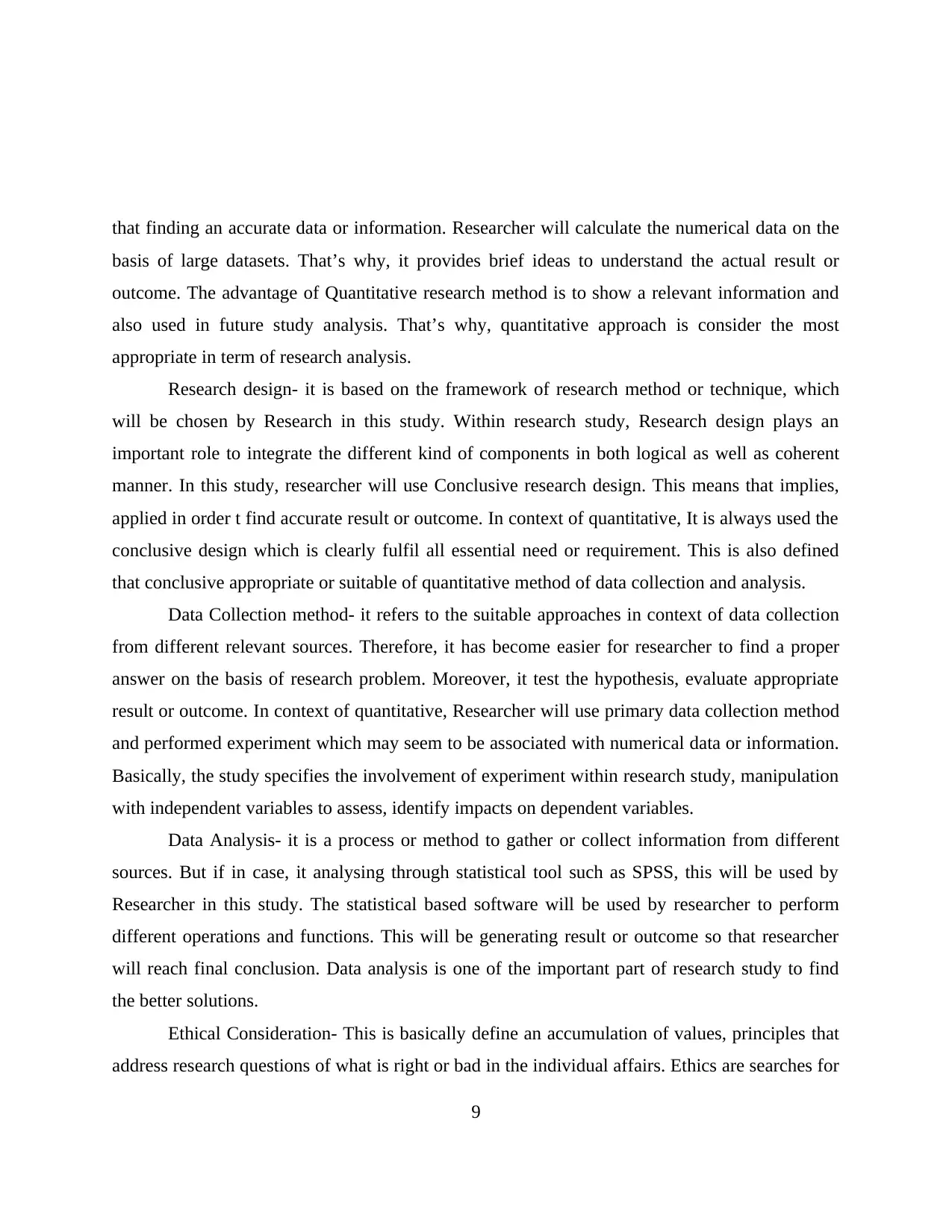
that finding an accurate data or information. Researcher will calculate the numerical data on the
basis of large datasets. That’s why, it provides brief ideas to understand the actual result or
outcome. The advantage of Quantitative research method is to show a relevant information and
also used in future study analysis. That’s why, quantitative approach is consider the most
appropriate in term of research analysis.
Research design- it is based on the framework of research method or technique, which
will be chosen by Research in this study. Within research study, Research design plays an
important role to integrate the different kind of components in both logical as well as coherent
manner. In this study, researcher will use Conclusive research design. This means that implies,
applied in order t find accurate result or outcome. In context of quantitative, It is always used the
conclusive design which is clearly fulfil all essential need or requirement. This is also defined
that conclusive appropriate or suitable of quantitative method of data collection and analysis.
Data Collection method- it refers to the suitable approaches in context of data collection
from different relevant sources. Therefore, it has become easier for researcher to find a proper
answer on the basis of research problem. Moreover, it test the hypothesis, evaluate appropriate
result or outcome. In context of quantitative, Researcher will use primary data collection method
and performed experiment which may seem to be associated with numerical data or information.
Basically, the study specifies the involvement of experiment within research study, manipulation
with independent variables to assess, identify impacts on dependent variables.
Data Analysis- it is a process or method to gather or collect information from different
sources. But if in case, it analysing through statistical tool such as SPSS, this will be used by
Researcher in this study. The statistical based software will be used by researcher to perform
different operations and functions. This will be generating result or outcome so that researcher
will reach final conclusion. Data analysis is one of the important part of research study to find
the better solutions.
Ethical Consideration- This is basically define an accumulation of values, principles that
address research questions of what is right or bad in the individual affairs. Ethics are searches for
9
basis of large datasets. That’s why, it provides brief ideas to understand the actual result or
outcome. The advantage of Quantitative research method is to show a relevant information and
also used in future study analysis. That’s why, quantitative approach is consider the most
appropriate in term of research analysis.
Research design- it is based on the framework of research method or technique, which
will be chosen by Research in this study. Within research study, Research design plays an
important role to integrate the different kind of components in both logical as well as coherent
manner. In this study, researcher will use Conclusive research design. This means that implies,
applied in order t find accurate result or outcome. In context of quantitative, It is always used the
conclusive design which is clearly fulfil all essential need or requirement. This is also defined
that conclusive appropriate or suitable of quantitative method of data collection and analysis.
Data Collection method- it refers to the suitable approaches in context of data collection
from different relevant sources. Therefore, it has become easier for researcher to find a proper
answer on the basis of research problem. Moreover, it test the hypothesis, evaluate appropriate
result or outcome. In context of quantitative, Researcher will use primary data collection method
and performed experiment which may seem to be associated with numerical data or information.
Basically, the study specifies the involvement of experiment within research study, manipulation
with independent variables to assess, identify impacts on dependent variables.
Data Analysis- it is a process or method to gather or collect information from different
sources. But if in case, it analysing through statistical tool such as SPSS, this will be used by
Researcher in this study. The statistical based software will be used by researcher to perform
different operations and functions. This will be generating result or outcome so that researcher
will reach final conclusion. Data analysis is one of the important part of research study to find
the better solutions.
Ethical Consideration- This is basically define an accumulation of values, principles that
address research questions of what is right or bad in the individual affairs. Ethics are searches for
9
⊘ This is a preview!⊘
Do you want full access?
Subscribe today to unlock all pages.

Trusted by 1+ million students worldwide
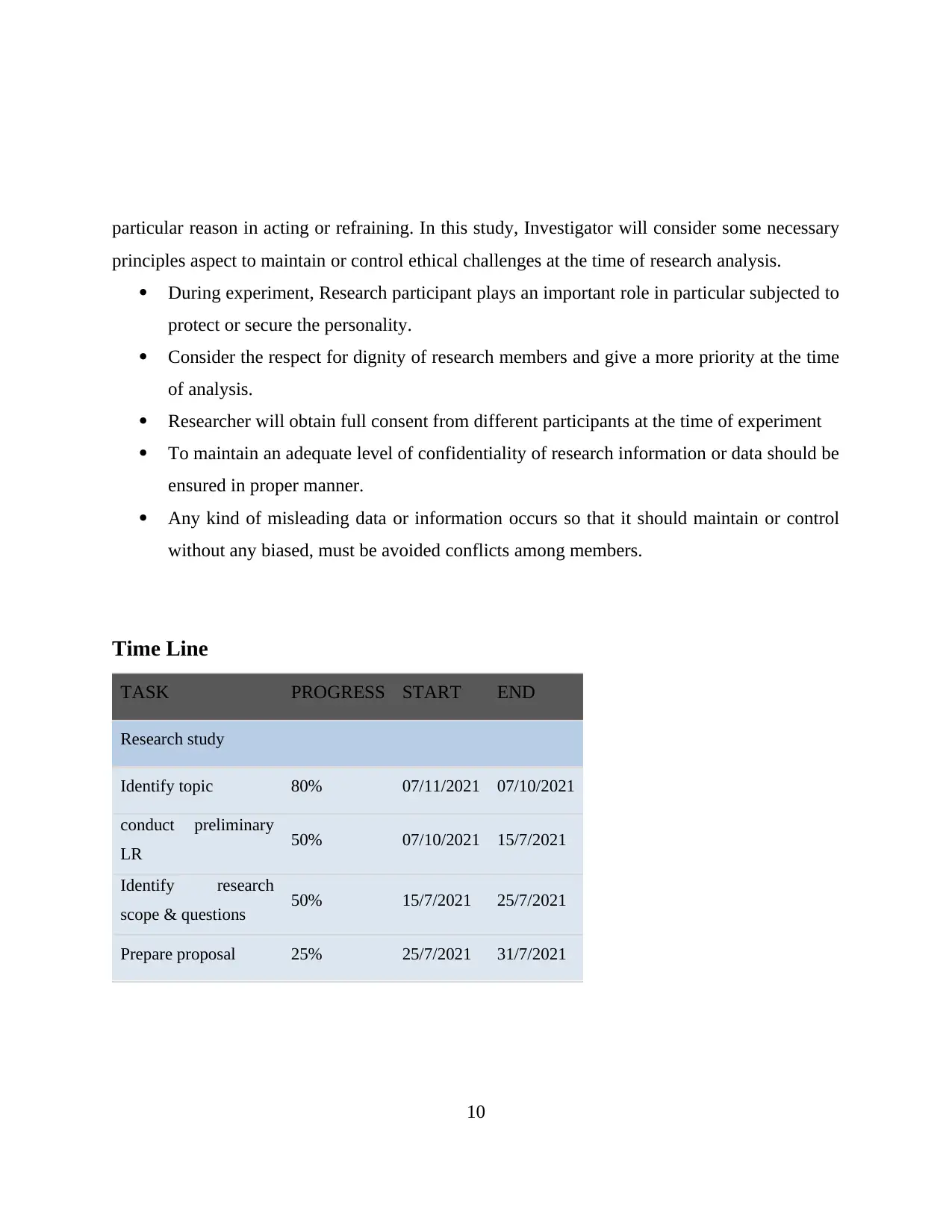
particular reason in acting or refraining. In this study, Investigator will consider some necessary
principles aspect to maintain or control ethical challenges at the time of research analysis.
During experiment, Research participant plays an important role in particular subjected to
protect or secure the personality.
Consider the respect for dignity of research members and give a more priority at the time
of analysis.
Researcher will obtain full consent from different participants at the time of experiment
To maintain an adequate level of confidentiality of research information or data should be
ensured in proper manner.
Any kind of misleading data or information occurs so that it should maintain or control
without any biased, must be avoided conflicts among members.
Time Line
TASK PROGRESS START END
Research study
Identify topic 80% 07/11/2021 07/10/2021
conduct preliminary
LR 50% 07/10/2021 15/7/2021
Identify research
scope & questions 50% 15/7/2021 25/7/2021
Prepare proposal 25% 25/7/2021 31/7/2021
10
principles aspect to maintain or control ethical challenges at the time of research analysis.
During experiment, Research participant plays an important role in particular subjected to
protect or secure the personality.
Consider the respect for dignity of research members and give a more priority at the time
of analysis.
Researcher will obtain full consent from different participants at the time of experiment
To maintain an adequate level of confidentiality of research information or data should be
ensured in proper manner.
Any kind of misleading data or information occurs so that it should maintain or control
without any biased, must be avoided conflicts among members.
Time Line
TASK PROGRESS START END
Research study
Identify topic 80% 07/11/2021 07/10/2021
conduct preliminary
LR 50% 07/10/2021 15/7/2021
Identify research
scope & questions 50% 15/7/2021 25/7/2021
Prepare proposal 25% 25/7/2021 31/7/2021
10
Paraphrase This Document
Need a fresh take? Get an instant paraphrase of this document with our AI Paraphraser
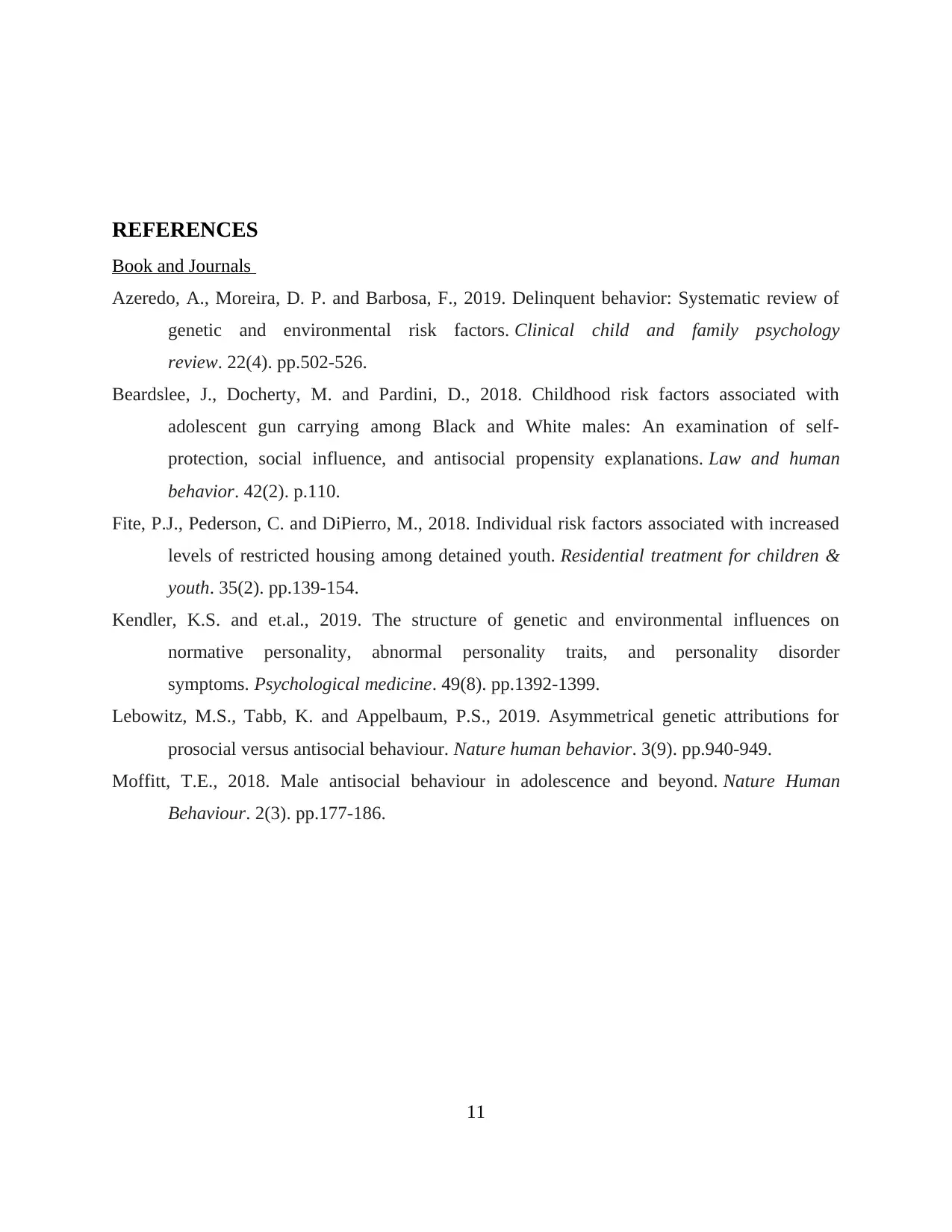
REFERENCES
Book and Journals
Azeredo, A., Moreira, D. P. and Barbosa, F., 2019. Delinquent behavior: Systematic review of
genetic and environmental risk factors. Clinical child and family psychology
review. 22(4). pp.502-526.
Beardslee, J., Docherty, M. and Pardini, D., 2018. Childhood risk factors associated with
adolescent gun carrying among Black and White males: An examination of self-
protection, social influence, and antisocial propensity explanations. Law and human
behavior. 42(2). p.110.
Fite, P.J., Pederson, C. and DiPierro, M., 2018. Individual risk factors associated with increased
levels of restricted housing among detained youth. Residential treatment for children &
youth. 35(2). pp.139-154.
Kendler, K.S. and et.al., 2019. The structure of genetic and environmental influences on
normative personality, abnormal personality traits, and personality disorder
symptoms. Psychological medicine. 49(8). pp.1392-1399.
Lebowitz, M.S., Tabb, K. and Appelbaum, P.S., 2019. Asymmetrical genetic attributions for
prosocial versus antisocial behaviour. Nature human behavior. 3(9). pp.940-949.
Moffitt, T.E., 2018. Male antisocial behaviour in adolescence and beyond. Nature Human
Behaviour. 2(3). pp.177-186.
11
Book and Journals
Azeredo, A., Moreira, D. P. and Barbosa, F., 2019. Delinquent behavior: Systematic review of
genetic and environmental risk factors. Clinical child and family psychology
review. 22(4). pp.502-526.
Beardslee, J., Docherty, M. and Pardini, D., 2018. Childhood risk factors associated with
adolescent gun carrying among Black and White males: An examination of self-
protection, social influence, and antisocial propensity explanations. Law and human
behavior. 42(2). p.110.
Fite, P.J., Pederson, C. and DiPierro, M., 2018. Individual risk factors associated with increased
levels of restricted housing among detained youth. Residential treatment for children &
youth. 35(2). pp.139-154.
Kendler, K.S. and et.al., 2019. The structure of genetic and environmental influences on
normative personality, abnormal personality traits, and personality disorder
symptoms. Psychological medicine. 49(8). pp.1392-1399.
Lebowitz, M.S., Tabb, K. and Appelbaum, P.S., 2019. Asymmetrical genetic attributions for
prosocial versus antisocial behaviour. Nature human behavior. 3(9). pp.940-949.
Moffitt, T.E., 2018. Male antisocial behaviour in adolescence and beyond. Nature Human
Behaviour. 2(3). pp.177-186.
11
1 out of 11
Related Documents
Your All-in-One AI-Powered Toolkit for Academic Success.
+13062052269
info@desklib.com
Available 24*7 on WhatsApp / Email
![[object Object]](/_next/static/media/star-bottom.7253800d.svg)
Unlock your academic potential
Copyright © 2020–2026 A2Z Services. All Rights Reserved. Developed and managed by ZUCOL.





